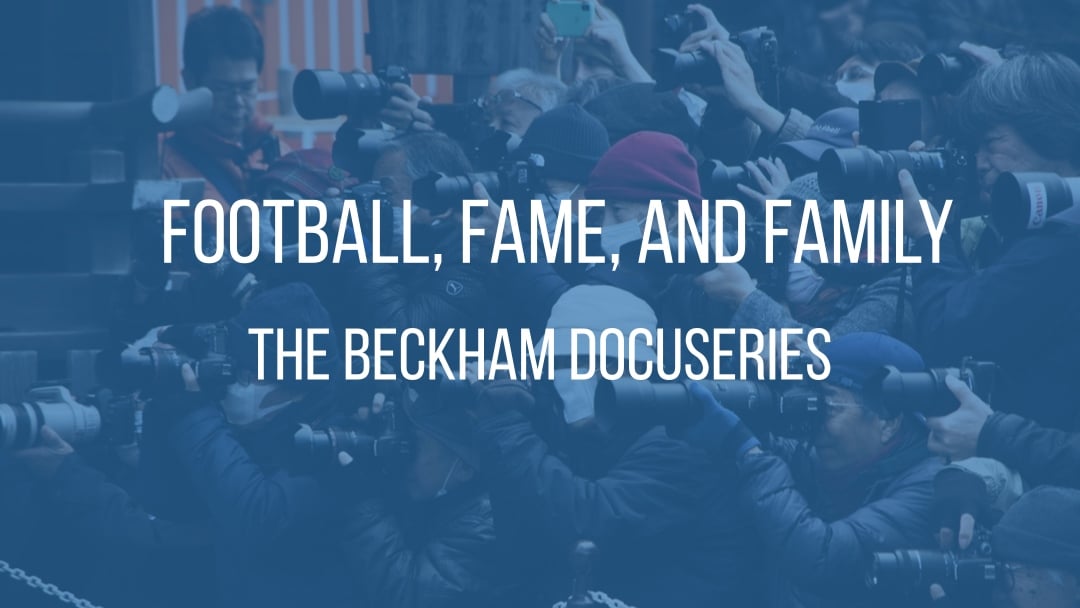Who is David Beckham?
Is he the self-absorbed, fame-seeking, Calvin Klein underwear model, husband of a former Spice Girl, always looking to be the center of attention? Or is he something else? Were the snapshots and the soundbites on television and the internet fair portrayals of the real David Beckham? These are questions raised by the popular new docuseries Beckham on Netflix.
But why, frankly, should ministry leaders give a rip?
Whom Shall We Exalt? Whom Shall we Humiliate?
After all, isn’t celebrity culture itself a toxic force? Isn’t it better to not give it the attention it feeds on? Perhaps, but by doing so we would miss, not just an an important human story, but something about the way the postmodern world works. It is eager to create and glorify its celebrities—only to turn on them when they do not meet its (or more properly, our) expectations.
In general, I don’t think the church has much of a clue as to how to respond to sports fandom, and much less the phenomenon of celebrity.
But when we ignore these realities, we ignore the places where we too are complicit. Our culture exalts celebrities as demigods, but abruptly demonizes them when they fail us. We treat them as commodities, not children of God, imbued with eternal dignity and worth by their creator. But let’s return to Beckham.
Celebrity Culture, All the TIme, Everywhere, All at Once
But how about a little context? David Beckham’s career was launched at the dawning of a new age, where celebrity culture was rapidly evolving into an ever-present global force. More and more, familiar characters, from Tom Cruise and Michael Jackson… and eventually David Beckham, entered our collective consciousness through print, television, and the (then) infant internet. Television shows like Entertainment Tonight, Extra, and Access Hollywood brought the little details of celebrity lives into our living rooms.
Try as you might (and many of us have!), you couldn’t get away from celebrities. They followed you everywhere. Even if you shut off your TV and radio, you still had to buy groceries. And there they were, in glossy displays by the checkout line.
The American (really, global) appetite for celebrities was bottomless. It was big business. (And it has only grown.) This cultural shift was just getting into full swing when Beckham came on the scene, combining dazzling displays of football skill (yes, I’m going to call it “football”) and model good looks. It didn’t hurt that he was dating (and later married) pop star Victoria Adams, then better known as “Posh Spice” of the Spice Girls.
And even as a fan of “the beautiful game,” I admit that I didn’t find David very likable. Pretty-boy models living with pop stars just don’t live in the same world I do.

But David’s story is about many of the same things our own stories are about: family, a passion to succeed in life, love and friendship, it’s about mistakes and betrayals, and the desire in some way, to account for the decisions, both good and bad, that mark a life.
In this sense, Beckham is a human story. The excellence in athletics and the celebrity may seem distant to us, but dealing with the pressures to perform, the outsized-expectations of the crowds, and the tragedies that befall all of us connects the Beckham story to each one of us—maybe especially pastors. Bear with me, I’ll explain that.
David Beckham, Rising Star
I asked, “Who is David Beckham?” The answer starts far from the spotlight.
The Netflix series starts with his childhood. He was just a boy who loved football (I’m sticking with that over “soccer”). Well, a boy who really loved football. He’d drill by himself for hours and hours. And then do it again. Later in life, when interviewed by W Magazine, he said, “At school whenever teachers asked, ‘What do you want to do when you’re older?’ I’d say, ‘I want to be a footballer.’ And they’d say, ‘No, what do you really want to do, for a job?’ But that was the only thing I ever wanted to do.” Raw talent plus that kind of dedication got noticed. But excellence on the pitch came with pressure to perform, applied by his father and father-figures like coaches.
And he got his dream job with his dream team, Manchester United at just 17. He was a go-to midfielder by his second season. And wins kept coming, the team managing to win a Treble (Premier League title, FA Cup, and Champions League title) in 1998-99, something only six teams have ever done and the first for England. Coming along for the ride in Beckham is exhilerating.
I started to find this pretty-boy quite… likable. He comes across as, what our British cousins might call, “a solid, decent chap.”
Victoria is central to his story. They started dating in 1997 and were married two years later. She loved his loyalty to his tight-knit working-class family. Her own family was similarly tight and hard-working… though not exactly working-class. In a funny scene in Beckham, he prods her to reveal what car she drove to school in. She reluctantly reveals, “a Rolls Royce.” And though it would be easy to be cynical about a celebrity “power couple” like the Beckhams—their marriage has remarkable staying power. They’ve been together for 20 years. And they have been tested.
The first test was football. David’s celebrity off the pitch and romance raised questions about his dedication to his team, especially with his coach, Sir Alex Ferguson. Pro football demands everything. So, as much teams benefit from celebrity stars, they resent any distraction from football. And getting rich and famous in one’s late teens is not a recipe for good judgment.
David’s Red Card
Despite complaints about David’s extra-curricular activities, he made England’s roster for the 1998 World Cup. Background for us Yanks: in 1998, England was excited. They had not won a world cup since 1966. And they had one of the best teams. It was their time. Only it wasn’t. And David was going to get the blame.
It didn’t start well. His idol, Glen Hoddle, accused him of being distracted and benched him for the first two games. But when he was on the field, he would “bend one like Beckham” in the third match for a 30-yard free kick for a 2-0 victory over Columbia.
But then, catastrophe. In the fourth game with arch-rival Argentina, David went down after being fouled by Diego Simone. On replay, you can see David’s foot strike out a kick toward Simone, who made the most of the opportunity to “flop.” But, you just don’t intentionally kick your opponents. Period. Red card. David was out of the game and England was a player down for the rest of the match. England lost in a penalty kick and were eliminated. David had blown their best shot at a World Cup in decades.
England… did not take it well. There were death threats. Bullets were mailed to Manchester United. He was even burned in effigy. The Daily Mirror printed a dartboard with a picture of David in the bullseye.

David went from hero to villain in a single night. Celebrity has a dark side.
In spite of curses and jeers at every game, David and Manchester United soldiered on, finishing the season brilliantly. Ill will faded, but the media circus remained. And his beloved Manchester United and his father-figure coach Ferguson got tired of it.
David’s Divorce with Mancheser United (and almost Victoria)
The team of his dreams traded him to Real Madrid in Spain. He was against it, but it didn’t matter.
International life didn’t suit him. He was isolated and depressed. Victoria was in London with their children. From boyhood, he had depended on family support, and it was gone.
Suddenly, the tabloids were reporting that he was having an affair. The Beckhams would absolutely not discuss this in the Netflix special. But whatever actually happened, his time in Madrid put their marriage on thin ice.
There is nothing like isolation and misery to drive us into temptation, especially when temptation takes the form of the intimacy we crave. It doesn’t excuse it, of course. I know someone who had an affair in somewhat similar circumstancs, while isolated and depressed. Rather than satisfying the need for intimacy, he reported that, “if you ever want to feel the worst you could ever feel, have an affair.” Maybe that’s where David ended up.
Whatever the truth of it, David and Victoria’s suffering was eaten up by the public. Every snippet of gossip or inuendo was published and read.
I think there is an opinion that if you are famous, if you are rich, you don’t need pity or sympathy. If you don’t worry about your next paycheck, you’re not like the rest of us.
But they remain human beings, unique creations of God. They suffer, too. Sure, they have money, but in the immortal words of the Notorious B.I.G., “Mo’ Money, Mo Problems.” The money and fame of the Beckhams attracted vitriol, scorn, and some ugly schadenfreude.
I didn’t find David likable before. What didn’t I like? Did I not like him because he was good-looking, good at football, and successful? Did I think of him as a human being in God’s image? It took Beckham to see him as just another flawed human with a story, part of a family with the love and dedication to persevere even through his sin.

Beckham and the Church
As I write this post, I am walking alongside a friend whose high-profile church is in a freefall after revelations about the senior/founding pastor emerged. Sadly, such stories are almost a daily occurrence. Viewers of Beckham will recognize some similarities: immense pressure to perform, lack of accountability, isolation, being “known” but not really known, the demand to live an “ideal” life…
And those vulnerabilities are not limited to high-profile pastors of big churches. Before I began The Pastor’s Workshop, I pastored a small church in rural Pennsylvania. Almost everyone I met knew who I was before I had a chance to introduce myself. I knew when I was in public that I was not a private person, but a public one that was being watched. Maybe the tabloids wouldn’t care if I made a misstep, but is the gossip mill much less insidious?
And pastors are not just public figures. They are leaders, expected to be the “strong one” who supports everyone else in their weakness. But what happens when you are the one suffering? Where can you turn to provide hope and healing?
Watching Beckham could be instructive for pastors. We judge celebrities. And the culture that surrounds them and elevates them is undeniably toxic. It’s not good for them. It’s not good for those who idolize (and later pillory) them. But seeing them as humans—ones who actually share a bit in our own experience—is important.
Crowds that shout “Hosanna!” turn on a dime, shouting “crucify him!” the next.
As for David—the docuseries doesn’t discuss his faith. A cusory internet search says that he has some Christian and Jewish roots, but his present faith is unclear. Interestingly, along with tatoos honoring his family, he chose to get a tatoo based on a painting by Matthew R. Brooks titled “The Man of Sorrows,” depicting Christ as the suffering servant from Isaiah 52 and 53:
He was despised and rejected by mankind,
a man of suffering, and familiar with pain.
Like one from whom people hide their faces
he was despised, and we held him in low esteem.
Maybe he sees the path to redemption we proclaim.
For his sake, I hope David’s next chapter is less dramatic than the past ones. But Beckham raises important questions for us:
- How do we feed into the celebrity culture that chews up and spits out its own?
- What does discipleship look like in a culture where idolizing and tearing down celebrities is ever-present?
- How do we as pastors deal with mini-celebrity in our communities? How do we foster proper boundaries and attitudes about our roles?
- How do we guard against temptations that present themselves with pressure, isolation, influence, and power in our communities?
- How do we deal with public sins in our communities where everyone is a minor celebrity—their lives posted online for everyone to see? How about the cyber-bullying of the innocent so common with our kids?
- How do we shape communities of disciples where gossip and schadenfreude are replaced by love and concern for persons as bearers of God’s image?
Who is David Beckham? Watch Beckham and see.

Stuart Strachan Jr. is an ordained Presbyterian Pastor as well as the founder and lead curator of the Pastor’s Workshop. His primary passion is equipping the saints for the ministry of the church (Ephesians 4). He loves preaching, teaching, and helping churches cast vision for what it means to follow Jesus in the 21st Century. He has served churches in a variety of capacities in California, Colorado, Pennsylvania, and Washington.
Stu is married to Colleen, who currently serves as a spiritual formation lead at Compassion International in Colorado Springs. Stu and Colleen have two children (Jack and Emma) whom they love deeply.
In his free time, Stu enjoys gardening, golf, reading a good book, and watching baseball.
Don’t Miss
The Latest From Our Blog
New Site Launches Tomorrow!
Watch this Space! Tomorrow (May 29) is the official launch of the new The Pastor's Workshop site! Return to this blog tomorrow morning for a post highlighting the new features and explaining how subscribers can get on and start using the site! Here are some new...
How You Can Prep for Pentecost
This was originally posted on May 12, 2016 on https://huffpost.com Pentecost Came Like Wildfire I'm lying on an ice pack early this morning, doing my back exercises and listening to Pray as You Go, a tool for meditation, with monastery bells, music, and a Bible...
Sacred Spaces: the Church Forests of Ethiopia
Let's Go to Ethiopia! Here’s a fun exercise with a spiritual payoff. Go to Google Maps and view aerial images of the South Gondar zone of Ethiopia. Use this button:When the page loads, you'll see a light brown countryside, mostly farmland. There are thin lines of dark...




